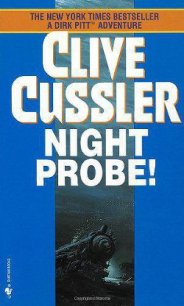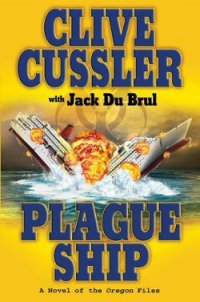Flood Tide - Cussler Clive (читать книги без txt) 📗
Gunn glanced over in the darkness. “You never met Dean Cooper Wallace when he was vice president?”
Sandecker shook his head. “From what I'm told, he has no use for NUMA.”
The limousine driver turned off Pennsylvania Avenue and circled into the barricaded drive to the White House, stopping at the northwest gate. “Here we are, Admiral,” he announced as he came around and opened the rear door.
A uniformed member of the Secret Service checked San-decker's and Gunn's IDs and crossed off their names on a visitors' list. Then they were escorted through the building's entrance and led to the West Wing reception room. The receptionist, an attractive lady in her late thirties with auburn hair tied in an old-fashioned bow, rose and smiled warmly. The sign on her desk read
ROBIN CARR.
“Admiral Sandecker, Commander Gunn, a great pleasure to meet you.”
“You work long hours,” said Sandecker.
“Fortunately, my time clock ticks in unison with the President's.”
“Any chance for a cup of coffee?” asked Gunn.
The smile faded. “I'm sorry, but I'm afraid there isn't time.” She quickly sat down, picked up a phone and simply said, “The Admiral is here.”
Within ten seconds, the new President's chief of staff, Morton Laird, who had replaced the hospitalized former president's right-hand man, Wilbur Hutton, appeared and shook hands. “Thank you for coming, gentlemen. The President will be pleased to see you.”
Laird came from the old school. He was the only chief of staff in recent history who wore three-piece suits with vests that sported a large gold chain attached to a pocket watch. And unlike most of his predecessors, who came out of Ivy League schools, Laird was a former professor of communications from Stanford University* A tall, balding man with rimless spectaclesr he peered through glistening fox-brown eyes beneath heavily thicketed eyebrows. He oozed charm and was one of the few men in the executive office whom everyone genuinely liked. He turned and motioned for Sandecker and Gunn to follow him into the Oval Office.
The famous room, whose walls had witnessed a thousand crises, the lonely burdens of power and agonized decisions that affected the lives of billions of people, was empty.
Before either Sandecker or Gunn could comment, Laird turned and said, “Gentlemen, what you will observe in the next twenty minutes is vital to our nation's security. You must swear never to breathe a word to anyone. Do I have your oath of honor?”
“I venture to say that in all my years of service to my government, I've learned and kept more secrets than you have, Mr. Laird,” said Sandecker with total conviction. “I will vouch for Commander Gunn's integrity.”
“Forgive me, Admiral,” said Laird. “It comes with the territory.” Laird walked over to one wall and tapped a concealed switch on the baseboard. A section of the wall slid aside, revealing the interior of an elevator. He bowed and extended his hand. “After you.”
The elevator was small and could hold no more than four people. The walls were finished in a polished cedar. There were only two buttons on the control panel, one up, one down. Laird pressed DOWN. The false wall inside the Oval Office silently returned to its place as the elevator doors met and sealed. There was no sensation of speed, but Sandecker knew they were dropping at a rapid pace from the falling sensation in his stomach. In less than a minute the elevator slowed and came to a soft stop.
“We're not meeting the President in the situation room,” said Sandecker, more as a statement than a question.
Laird looked at nun questioningly. “You guessed?”
“No guess. I've been there on several occasions. The situation room sits much deeper than we've traveled.”
“You're very astute, Admiral,” replied Laird. “This elevator goes less than half the distance.”
The doors smoothly parted, and Laird stepped out into a brightly lit, immaculately maintained tunnel. A Secret Service agent stood beside the open doors of a small, customized bus. The ulterior was fitted out like a small office, with plush leather chairs, a horseshoe-shaped desk, a well-stocked minibar and compact bathroom. Once everyone was comfortably seated, the Secret Service agent eased behind the wheel and spoke into a microphone with an earpiece placed on his head. “Swordfish is leaving the premises.” Then he engaged the transmission, and the bus moved off soundlessly into a large tunnel.
“Swordfish is my code name with the Secret Service,” Laird explained almost sheepishly.
“Electric motor,” commented Sandecker on the silent running of the bus.
“More efficient than building a complicated ventilation system to draw off the exhaust fumes of gas engines,” explained Laird.
Sandecker stared at the side entrances leading off from the main tunnel in which they were traveling. “There's more to underground Washington than most people imagine.”
“The system of passages and thoroughfares beneath the city form an intricate maze well over a thousand miles in length. Not exactly public knowledge, of course, except for tunnels built for sewage, drainage, steam and electrical wiring, but there is an extensive network in daily use for vehicular transportation. It spreads from the White House to the Supreme Court, Capitol building, State Department, under the Potomac to the Pentagon, the Central Intelligence Agency headquarters in Langley, and about a dozen other strategic government buildings and military bases in and around the city.”
“Something like the catacombs of Paris,” said Gunn.
“The Paris catacombs pale in comparison to Washington's underground web,” said Laird. “May I offer you gentlemen a drink?”
Sandecker shook his head. “I'll pass.”
“Not for me, thank you,” answered Gunn. He turned to the admiral. “Did you know about this, sir?”
“Mr. Laird forgets that I've been a Washington insider for many years. I've traveled a few of the tunnels from time to time. Because they run below the water tables, it takes a small army of maintenance people to fight the invading damp and slime to keep them dry. There are also the derelicts, drug dealers and criminals who use them for warehousing illegal goods, and the young people who get a high partying in dark and eerie chambers. And, of course, reckless daredevils driven by curiosity and a lack of claustrophobia who find sport in exploring the passageways. Many of them are experienced cavers who find unknown labyrinths a challenge.”
“With so many intruders wandering in and out, how can they be controlled?”
“The main arteries crucial for government operations are guarded by a special security force which monitors them by video and infrared sensors,” Laird said by way of explanation. “Penetration into critical areas is next to impossible.”
Gunn said slowly, “This is certainly news to me.”
Sandecker smiled enigmatically. “The President's chief of staff neglected to mention the escape tubes.”
Laird covered his surprise by pouring himself a small glass of vodka. “You're extraordinarily well informed, Admiral.”
“Escape tubes?” Gunn asked mechanically.
“Shall I?” Sandecker asked almost apologetically.
Laird nodded and sighed. “It seems government secrets have a short life.”
“A script straight out of science-fiction movies,” Sandecker continued. “Until now, saving the President, his Cabinet and the military Chiefs of Staff during a nuclear strike by whisking them away by helicopter to an airfield or an underground operations center was a fallacy almost from the beginning. Submarine missiles fired from a few hundred miles out at sea during a surprise attack could rain down on the city in less than ten minutes. Not nearly enough time to carry out an emergency evacuation.”
“There had to be another way,” added Laird. “And there is,” Sandecker went on. “Underground tubes leading out of the city were constructed using electromagnetic technology that can hurl a convoy of canisters containing high-ranking people from the White House and classified material from the Pentagon to Andrews Air Force Base and into the basement of a hangar where an air-command-transport version of the B-2 bomber is prepared to take off within seconds of their arrival.”




